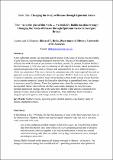Files in this item
'As to the plan of this work … we think Dr. Baillie has done wrong' : changing the study of disease through epistemic genre in Georgian Britain
Item metadata
| dc.contributor.author | Bellis, Richard Thomas | |
| dc.date.accessioned | 2019-12-10T12:30:18Z | |
| dc.date.available | 2019-12-10T12:30:18Z | |
| dc.date.issued | 2020-03-20 | |
| dc.identifier | 264039810 | |
| dc.identifier | a03f7a51-36b0-4ad5-8b44-4e35cae3d6fe | |
| dc.identifier | 85083104980 | |
| dc.identifier | 000649162600002 | |
| dc.identifier.citation | Bellis , R T 2020 , ' 'As to the plan of this work … we think Dr. Baillie has done wrong' : changing the study of disease through epistemic genre in Georgian Britain ' , Notes and Records of the Royal Society . https://doi.org/10.1098/rsnr.2019.0036 | en |
| dc.identifier.issn | 0035-9149 | |
| dc.identifier.other | ORCID: /0000-0003-1039-3138/work/158592705 | |
| dc.identifier.uri | https://hdl.handle.net/10023/19109 | |
| dc.description.abstract | In the eighteenth century, the writing of case histories, incorporating findings at post-mortem, was central to how the study of disease was practised. The use of this epistemic genre reflected the work of medical practitioners with their patients. By contrast, Matthew Baillie's Morbid Anatomy (1793) was a work of anatomy on the subject of disease that promoted an anatomical approach to the study of disease and stemmed from his own, different practice, which was anatomical. This was criticized by contemporaries who were sceptical that such an approach would prove useful to the physician's practice. Baillie's work took on the features of anatomy books, and omitted many of the features central to the writing of case histories, such as patient narratives. Instead he focused on describing, in generalized terms, the changes in structure caused by disease. These descriptions were valued by contemporaries, who incorporated his descriptions into their own works, changing the way that cases included anatomical findings. At the same time, Baillie's later editions contained more features of cases, such as descriptions of symptoms. Thus, individual books worked to integrate epistemic genres, and change practice in the study of disease. | |
| dc.format.extent | 20 | |
| dc.format.extent | 380692 | |
| dc.language.iso | eng | |
| dc.relation.ispartof | Notes and Records of the Royal Society | en |
| dc.subject | Matthew Baillie | en |
| dc.subject | Epistemic genre | en |
| dc.subject | Morbid anatomy | en |
| dc.subject | Case history | en |
| dc.subject | Study of disease | en |
| dc.subject | Eighteenth century | en |
| dc.subject | DA Great Britain | en |
| dc.subject | RB Pathology | en |
| dc.subject | T-NDAS | en |
| dc.subject.lcc | DA | en |
| dc.subject.lcc | RB | en |
| dc.title | 'As to the plan of this work … we think Dr. Baillie has done wrong' : changing the study of disease through epistemic genre in Georgian Britain | en |
| dc.type | Journal article | en |
| dc.contributor.institution | University of St Andrews. School of History | en |
| dc.identifier.doi | https://doi.org/10.1098/rsnr.2019.0036 | |
| dc.description.status | Peer reviewed | en |
This item appears in the following Collection(s)
Items in the St Andrews Research Repository are protected by copyright, with all rights reserved, unless otherwise indicated.

